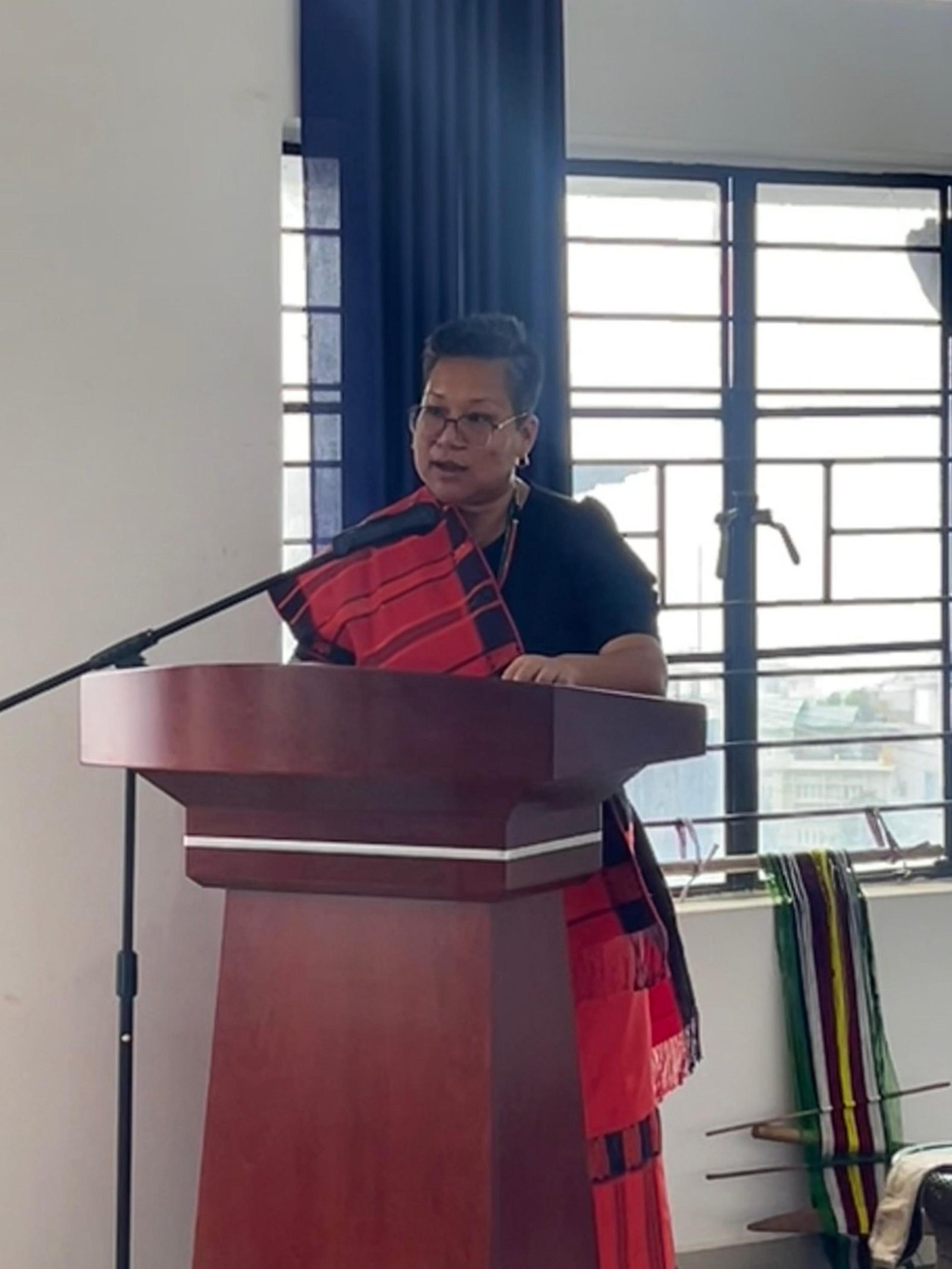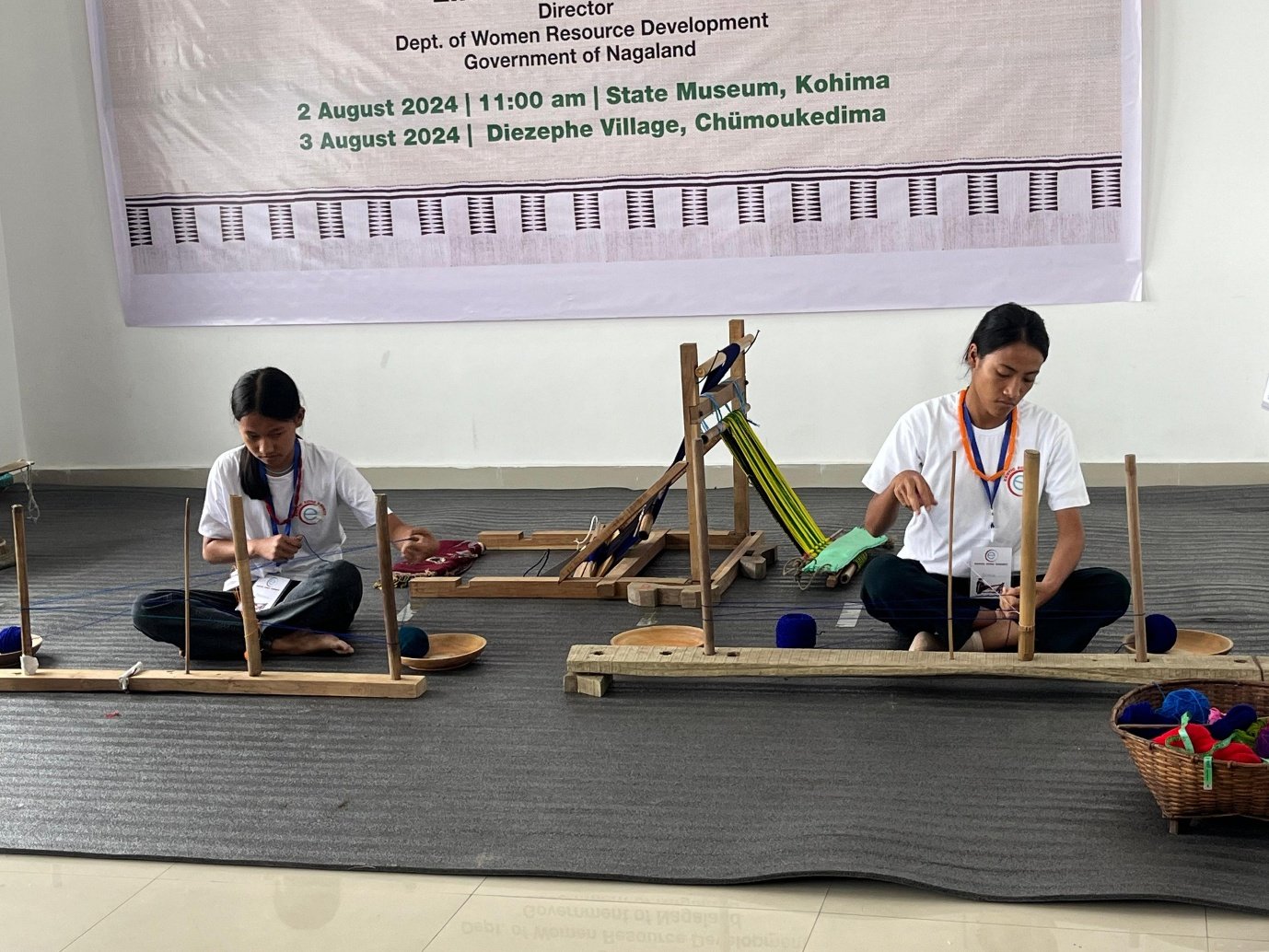A two day training on basic loinloom weaving for children and women is currently underway with the first day held at State Museum Kohima on August 2. The training is organised by Exotic Echo Society and venue host by Art and Culture Department in collaboration with Department Of Women Resource Development.
Kekuwe Lomi, a Master weaver from Leshemi, Phek District, was honored with a certificate of appreciation for her dedication. Reflecting on her journey, Lomi highlighted the societal challenges that women face in accessing opportunities to showcase their talents. Despite challenges, Lomi drew attention to the abundance of untapped potential among the Nagas, believing that with proper support and platforms, the women of Nagaland can make significant contributions to the community.
“My passion for weaving stemmed from my childhood, inspired by my mother’s craftsmanship, using materials like stinging nettle plants,” said Lomi who also expressed gratitude to Vitono Haralu for providing exposure, guidance in navigating the market, research assistance, product development, and facilitating initiatives like the current program, enabling their growth and success.

“It brings me immense joy to witness our creations gifted to VIPs at significant events, recognizing the value and importance of such moments in boosting their morale and determination. Despite facing societal stereotypes and belittlement associated with being called “weavers,” I encourage all artisans to persevere, work diligently, and seize the numerous opportunities available to them,” said Lomi.
Vitono Gugu Haralu informed that the project is funded by the Chief Minister innovation funds to empower children and women in traditional weaving. The initiative will reach out to districts like Kohima, Meluri, Noklak, Peren, Phek, and others interested in capacity training. It also aims to train over 500 individuals, especially women, in weaving skills to empower them and raise awareness of their rights. The training targets children aged 7 to 13, considered the best age for foundational learning.
Haralu also emphasized the significance of maintaining indigenous weaving to support traditional artisans and discouraging the digitization of traditional attire and indigenous designs.
“Today, we witness a surge of celebrities and influential figures blurring the lines between authentic and inauthentic attire, causing confusion. This platform aims to educate individuals to know more about their traditional clothing and attired , seeking to promote culture. It emphasizes respecting do’s and don’ts,” asserted Haralu.
The Importance of modernizing traditional local artisan products was also stressed. “When digitizing and promoting them, it’s crucial to consider whether the community or individuals benefit. Often, individuals or communities profit for themselves, leaving the larger community behind,” said Haralu advocating for artisans to have a platform to voice their rights, both positive and negative, to enhance growth and ensure their interests.

Download Nagaland Tribune app on Google Play

Haralu also highlighted that they aim to reach a hundred weavers from five districts, focusing on interested children, women, and skilled individuals. For instance, skilled viewers proficient in making mekhala, shawls, and cushion covers may lack expertise in other areas like table runners. Their goal is to cater to a wide range of potential viewers, identifying areas where they need to learn and improve through design thinking.
Haralu also underscored the need to talk about the misuse of natural resources and traditional attire as every tradition has a meaning and history so everyone should respect the culture.

Special Guest, Vilone Sakhrie, Director of Women Resource Development, expressed gratitude to Chief Minister Neiphiu Rio of Nagaland for assisting the weavers of the state. Considering the training as a crucial initiative, Sakhrie highlighted the effective utilization of funds in organizing programs such as today’s. Sakhrie mentioned their efforts in seeking support from the Central government to aid the weaving community, while also emphasizing the promotion of culture and tradition. Additionally, he outlined the goal of creating products with locally sourced raw materials to empower women economically.

In her welcome address, Adela Moa, Director of the Art and Culture Department, commended Vitono Haralu, Secretary of Exotic Echo, for initiating and hosting the program. She expressed hope that the event would leave a positive impact on the minds of the children in attendance.
Following the program, the special guest delivered words of encouragement and launched the Loinloom weaving training project funded by the CM Innovative Fund.
The activities included Kohima Museum Tour, loinloom, warping, weaving and quiz competition (National handloom day), and weavers award ceremony.
The winners of the first day competitions were:
Warping winners – Tsukulu & Khrutsolu
Weaving winners – Mhaleno & Kuvesalu
The second day of the training will be held at Diezephe village, Chümoukedima.

